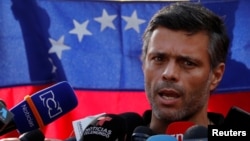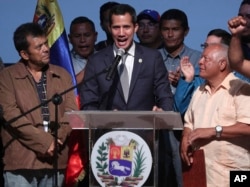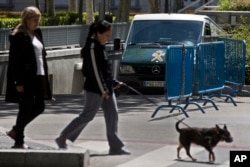Madrid is increasingly taking center stage in Venezuela's crisis as talks to get president Nicolas Maduro to resign appeared to collapse and its embassy in Caracas gives refuge to Leopoldo Lopez, the opposition leader who escaped house arrest and led an abortive military rebellion last week.
Involving Spain in schemes to manipulate Maduro into stepping down may have prompted what some analysts say was a premature revolt by regime opponent backed by soldiers who believed Maduro's defense minister and other key aides were ready to abandon him.
"The armed forces are dividing, it's the worst scenario" said Spanish foreign minister Josep Borrel when a group of armed national guardsmen protecting Lopez and parliamentary leader Juan Guadio appeared in front of a military base in Caracas calling for an uprising against the government.
Statements that Lopez gave to the press from the Spanish embassy, saying that there were negotiations with the "highest echelons of the regime" to ditch Maduro, drew criticism from Spanish leftists. Conservatives, on the other hand, said Spain had a "duty" to protect Lopez, whose father is a Spanish national running for the European parliament on the Popular Party ticket.
Spain has been split on Venezuela since Juan Guaido challenged the legitimacy of president Maduro last February, calling on the army to withdraw support from a government installed through elections widely denounced as fraudulent.
Prime Minister Sanchez took almost two weeks to follow President Donald Trump in recognizing Guaido, holding back the rest of the European Union where Spain is the government of reference on Venezuela due to its extensive commercial and cultural ties with its one time colony where more than 175,000 Spanish nationals reside.
Sanchez backed the formation of a contact group composed of EU and some Latin American governments to seek Maduro's agreement on holding new elections.This riled relations with the United States and the Venezuelan opposition who say that free elections are impossible with Maduro in power.
Despite these differences, U.S. Special envoy for Venezuela Eliott Abrams has tried to use Spain's influence with the Venezuelan government to bring about the bloodless collapse of Maduro's rule, among other things by getting Spain to receive Maduro allies who opt to leave Venezuela as part of a transition.
Abrams visited Madrid in April to ask the Spanish government to arrange safe haven for officials accused of human rights violations and massive corruption as part of a negotiating strategy to secure Maduro's ouster without requiring a military intervention, which the Spanish government opposes and the Trump administration seeks to avoid.
"We believe that when Maduro falls, some members of his regime, of the military, will probably want to go into exile", said Abrams in a news conference at the U.S. embassy in Madrid.He stated that EU countries could contribute to the transition to democracy by "offering them a place to go."
Abrams met with several top Spanish officials, including Borrel the director of the Spanish foreign ministry's Latin American section and a chief aide to Prime Minister Sanchez.U.S. sanctions affecting Spanish oil investments in Venezuela were also discussed, according to Abrams.
Trump's special envoy told the newspaper ABC that he was talking with 22 of 33 members of Maduro's ruling circle considered vital to the regime. They included Defense Minister Vladimiro Padrino as well as heads of military intelligence, the police, Supreme Court judges, and even leaders of paramilitary "colectivos" according to Spanish diplomatic sources.
Venezuela's ex-spy master, Gen. Hugo Carvajal, escaped to Spain after supporting Guaido when the parliamentary leader first challenged Maduro last February.
Carvajal's arrest in mid April at his son's apartment in Madrid on drug charges filed by U.S. law enforcement agencies almost 10 years ago may have caused a billiard effect on Maduro officials, according to some analysts.
Dr Evan Ellis, a Latin America specialist at Washington's Center for Strategic and International Studies, says the arrest may have driven other members of Maduro's team to try cutting their own deals in confused talks that triggered last week's coup attempt.
"Carvajal's chavista colleagues probably suspected that he would talk, and thus probably had a price on his head ... so now that he's out of their reach, and probably cooperating to save his skin. Many of them must be very worried about what he knows about their personal activities and money laundering schemes, " he told VOA.
Spain has been the destination for billions of dollars funneled out of Venezuela by corrupt officials who have laundered the money into major real estate purchases in Madrid and the luxury beach resort of Marbella, according to Spanish government investigators.







